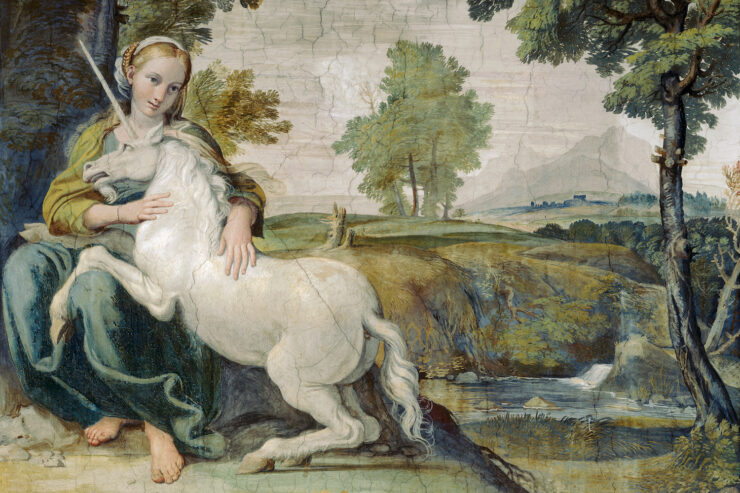What would it be like if pigs could give helpful advice? If dragons could provide emotional support? If snakes could cure all ailments? Humans have a fondness for sharing space with different species, but what would our world would look like if our non-human companions had magic? Here are some intriguing scenarios to consider…
“Four Pieces of Advice on the Selection of a Familiar” by Kelly M. Sandoval
It’s time for Lena to choose a familiar, and everyone has advice to offer. Her mistress advises her to choose something beautiful, while her father suggests getting something practical and useful. They all offer logical approaches, but, when the time comes, Lena might have to think differently. Can she make a good choice?
“The Long View” by Susan Palwick
As the director of the Office of Animal Affairs, dealing with unusual requests regarding students’ emotional support animals is Elliott’s daily job. There’s one student, however, that Elliott would rather not deal with. Tatiana Prentiss can sue her way out of every situation she doesn’t like, so he’s not very excited when she shows up with a dragon, asking Elliott—and pretty much everyone else at the university—to make space for the creature. A simple no won’t work here. But what’s the best solution to this tricky situation?
“My Custom Monster” by Jo Miles
Our narrator gifted her niece a Custom Monster and little Gemma loved it very much indeed. But turns out they’re not just toys for kids—everyone is raving about how happy their monster makes them. Our narrator is skeptical, but gives in eventually—depression isn’t always easy to deal with, after all, and maybe everyone is right about the Custom Monsters, after all…
“Six Fictions About Unicorns” by Rachael K. Jones
When you tried to run away from home, you mostly failed. What you did find was not adventure, but a unicorn, which you brought home with you. Soon, having the unicorn means people don’t notice the little things you used to be insecure about. They are jealous, mean, sometimes unbelieving. But you know better—you know unicorns.
So the two of you remain together, growing up, until you find that the unicorn keeps getting in the way, until you try to get rid of it because you’ve always known that you weren’t worthy enough to have one in the first place. But it doesn’t work like that. How can you navigate together a world that doesn’t really have the space for both of you?
“The Magical Sow” by Wen Wen Yang
Zhu, the family sow, can talk, but she does so only with the Middle Sister, our narrator. They notice that Biyu, the Little Sister, is hiding the fact that her husband abuses her. Something needs to be done, but it won’t be easy—Biyu’s husband is a constable and our narrator is a farmer, not a fighter. Fortunately, Zhu is there to help.
“From the Archives of the Museum of Eerie Skins: An Account” by C.S.E. Cooney
While witches can perform magic, wolfcasters like Firi Kanaphar cannot. Their powers are stored in their pelts and they cannot be killed when they’re wearing them. In order to kill a wolfcaster, their pelt needs to be destroyed. In this transcript, Firi recounts how a rich student stalked her using all the means he had at his disposal, found her pelt, and cut it up into a hundred pieces. There were no laws at the time that would help her get justice. Then an opportunity arrived in the form of an invitation to contribute to an event on the past and present of wolfcasters at the Museum of Eerie Skins. Joined by her mother and friends, Firi’s actions ended up creating an impact that mere retaliatory violence—suggested several times—would never have had.
“A Brief Catalog of Humans, as Observed by the Cryptids of Encante” by Ruth Joffre
Unlike the other stories on this list, this catalog looks at the human/magical creature relationship from the other side, detailing the observations of humans made by the Cryptids of Encante. They’ve identified and categorised humans into types based on the humans’ beliefs and the harm they might cause—for example, the Myopic Cryptozoologist and the Ardent Disbeliever. Going a step further, the catalog also offer a warning and poses a final question—one which challenges readers to rethink their own assumptions.
“The Science and Artistry of Snake Oil Salesmanship” by Timothy Mudie
Aloysius P. McNutt and Snake travel across the frontier. First goes Snake, terrorising the residents, and then arrives Al, ready to save them. A mock fight ensues, followed by the extraction of the creature’s elixir, a potion that cures all illnesses. It should sell for a fortune, but it also sounds too good to be true, so Al is forced to pretend to be a hack and perform his act, over and over. Sometimes, that’s the only way of doing good in the world.
“The Zee” by Tim Lees
Kurt Carter, host of a show on urban cryptozoology, is obsessed with “tracking down the creatures science won’t admit exist.” In his short-lived career, he takes viewers around cities, documenting the supposed habitats of these beings that live among us. But there’s one creature he keeps mentioning, an obsession that overrides all others—the Zee, a creature that cannot be defined, a creature that resists specifics, a creature that Kurt believes destroyed his family and which he’s determined to track down, no matter how long it takes and no matter what happens to the show. His curiosity keeps him going, but audiences can’t wait forever. What will this star do to make his case now?










